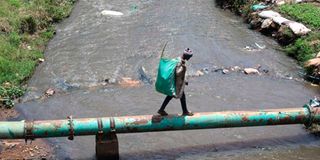Address waste water AMR

A man walks on a sewer line on River Kiuu that passes in Kahawa West on February 16, 2021.
Microbial pathogens, particularly the enteric type, pose a great risk to public health. The World Health Organization lists antimicrobial resistance (AMR), mainly caused by the indiscriminate use of antibiotics, in the top 10 most serious threats to medical practice.
The Health ministry’s 2017 “One-Health campaign” and the Alliance for the Prudent Use of Antibiotics’ (Apua) 2019 “National Antibiotics Stewardship Guidelines (NASG)” were aimed at persuading health workers and drug manufacturers about drug safety and informing the public of the the link between access antibiotics benefits and their efficacy.
Antimicrobials enter the environment through a variety of routes but, most significantly, wastewater treatment plant effluent. The common three-step waste water treatment process is incapable of removing all pharmaceutical residues, making wastewater and treatment sites potential pathways for continuous antibiotic flow into hydrological cycles.
Among several research studies, a 2015 one blames pharmaceutical residues and other contaminants for resistant strains while another says AMR in waste water occurs by direct transmission of resistant strains and/or environmental matrices.
Globally, public health professionals and microbiologists see slaughterhouses as a major contributor to the rising levels of AMR in urban areas as many zoonotic infections can be carried by farm animals. Since many people believe waste water is safe for landscape and agricultural irrigation, a lack of knowledge about the presence of enteric pathogens in animal wastewaters prevents a critical understanding of their occupational health risks. It also delinks the clinical treatment of enteric illnesses from the impacts and results of antibiotic pollution.
Large-scale surveillance of AMR and an understanding of how antibiotic resistance spreads through animal effluent, sewage and recreational waterways, and the magnitude to which this affects human health, should be made a national priority.
Mr Onyango, a Life Scientist, is a Global Fellow at Moving Worlds Institute (MWI).





